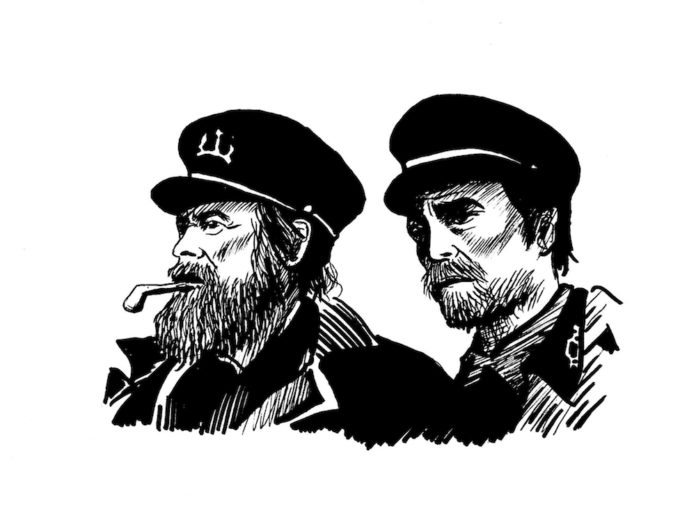Spoiler Alert: This article contains specific details of the film “The Lighthouse.”
Director Robert Eggers’ latest highbrow-horror film “The Lighthouse” is a frustrating watch. It asks the audience to make meaning out of a completely amoral story. Arduous performances from Willem Defoe and Robert Pattinson star in this bleak drama about two wickies who quickly descend into extreme psychosis. The film has grossed 8 million dollars since it was released Nov. 8. It follows Ari Aster’s summer blockbuster “Midsommar” and joins the list of chic productions from the entertainment company A24. This brand of slick art-house horror has become a commercial avenue for creative alternatives to Hollywood’s superhero preferences. Open-ended symbols and ambiguous endings are staples that one comes to expect from such films. What “Hereditary,” “Midsommar” and “The Lighthouse” share is the evocation of shock sandpapered over by crisp aesthetic competence. All three are loaded with themes, but they lack any sense of virtue. “The Lighthouse” leaves the door wide open for misdirection and mystery. The black-and-white 35mm film produces shadows that steal light and darken the theater. In trying to find Eggers’ message, the audience locks into a dizzying mental meltdown.
With only two speaking characters, the film hinges on the relationship between Defoe as Thomas Wake and Pattinson as Ephraim Winslow. They are scheduled to work together as lighthouse keepers on an island in the late 19th century. Eggers gives his audience no time to settle in; the disorientating elements are introduced without buildup. From the very beginning, we are thrust into the wear-and-tear conditions of their somber setup. Winslow is haunted by reoccurring visions of a mangled mermaid washed up along the shore, and as his hallucinations intensify, the pair’s material existence is called into question.
Wake and Winslow’s contentious relationship flickers with friendship on the eve of what they believe will be the last night together. When a wicked storm crashes into the island, it halts their departure and depletes their resources. In order to create an incoherent sense of time, Eggers splices their durational experience with quick sequences. The stark contrast between bright afternoons and pitch-black nights puts a visual tax on the eyes of the viewer. Sometimes it feels like walking through the dark with two delusional pirates screaming in your ear. As each evening falls, it raises the stakes and brings the worst drinking habits out of both men. Their midnight arguments are full of flared-up tensions. Still, these moments rarely point the film in a coherent direction or reveal purpose in either character. Winslow is the focus, presumably because he’s the younger man with more to lose, but his privacy is impenetrable.
“The Lighthouse” owes a bit to Ingmar Bergman’s 1966 masterpiece titled “Persona.” In one of film’s greatest psychological probes, the Swedish director blurs the identities of two women staying together on a beach. As “Persona” unravels, it builds on a clash of personalities that subliminally submerge into one another. Eggers takes that situation, recreates some of its elements and remains original by reshaping the dynamic between the two men. Despite some of the clear visual, locational and thematic similarities, I struggled to make the connection at first. “The Lighthouse” is a draining film, but it doesn’t leave half the impact of “Persona.” Without a moral fulcrum, the decisions of Wake and Winslow come off as arbitrary. At the beginning of “Persona,” we are let into Alma’s innermost conflict through the boy stuck in purgatory. His fate rests in her hands and he represents an origin point for her repression. In “The Lighthouse,” Winslow’s behavior becomes unhinged, but his suffering is linked only to Wake’s rambling superstitions.
Instead of opting for a slow burn, Eggers accelerates Winslow’s hallucinations. The lack of informational build up creates a gap between the viewer and the film’s detail. If tragedy was the built-in fate of this young lighthouse keeper, then where is the catharsis? The ending, while visually and audibly powerful, lacks a definitive interpretation. When Winslow finally reaches the top of the lighthouse, the screen is flooded with light. The dirt caked onto his face looks like a mask, and his eyes gleam with curiosity. Alas, Eggers keeps the secret for himself. Whatever burns at the center of the lighthouse remains a mystery: the viewer only gets Winslow’s crazed reaction. His screams are pitched to a monstrous distortion for the most dramatic moment of the film.
The director opened up his intentions in a recent interview with Esquire.com.
“There isn’t a lot of plot; it’s kind of the same scene over and over again, just slightly different, so we do have to find ways to keep tension and keep people engaged, and we’re trying to do that through confusion and ambiguity,” Eggers said.
I appreciate his honesty, and “The Lighthouse” is an ambitious effort. However, the grueling experience of this film comes with little payoff. His stylistic strategy hollows out the story’s center and leaves the viewer lost at sea.
![]()




































